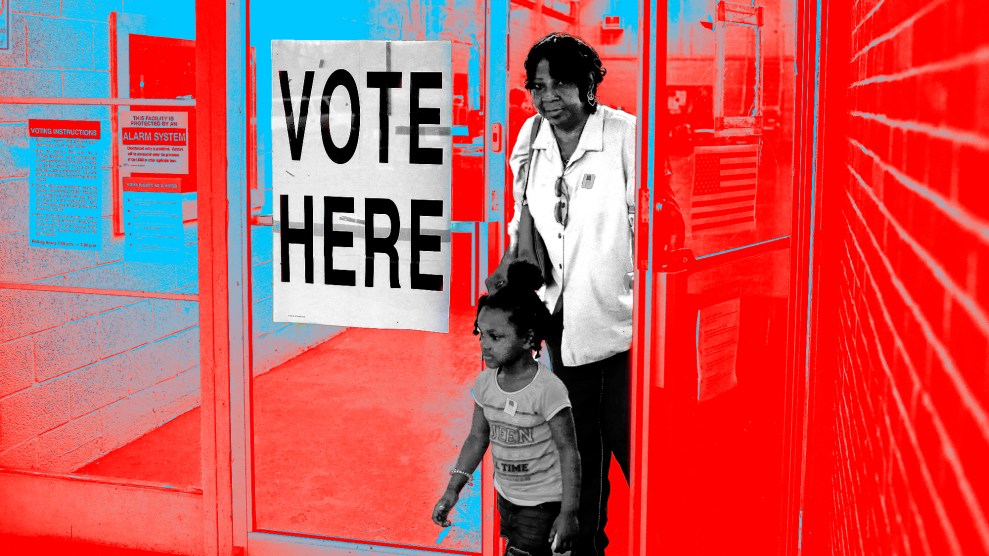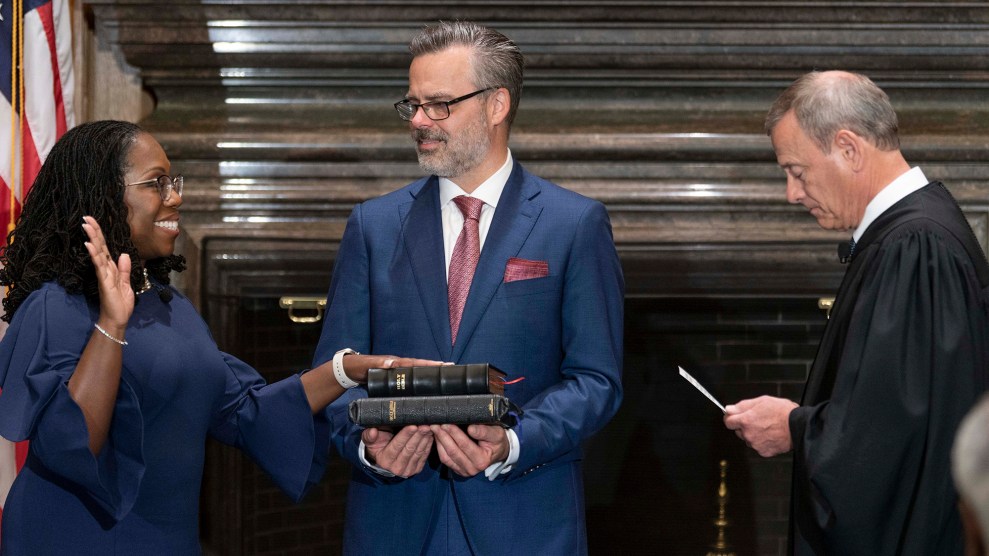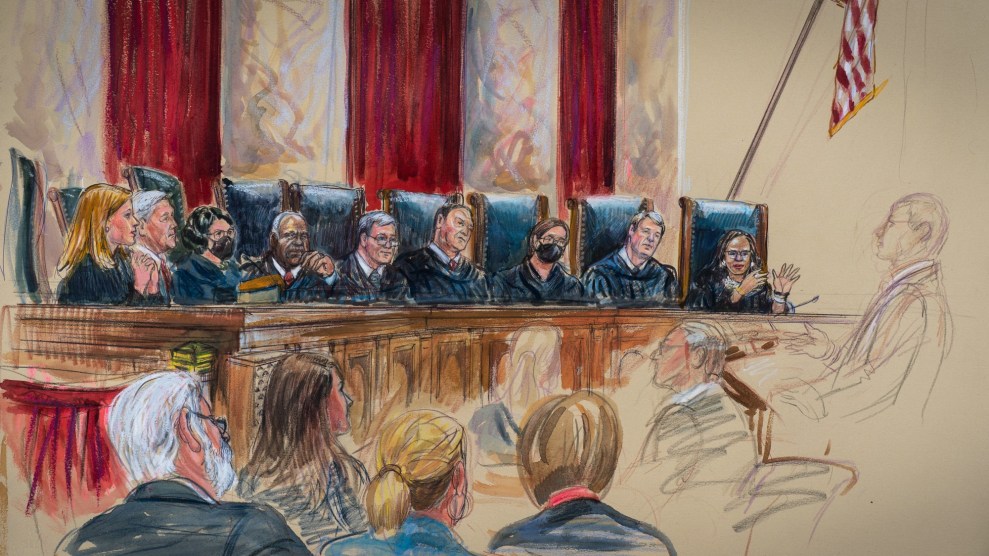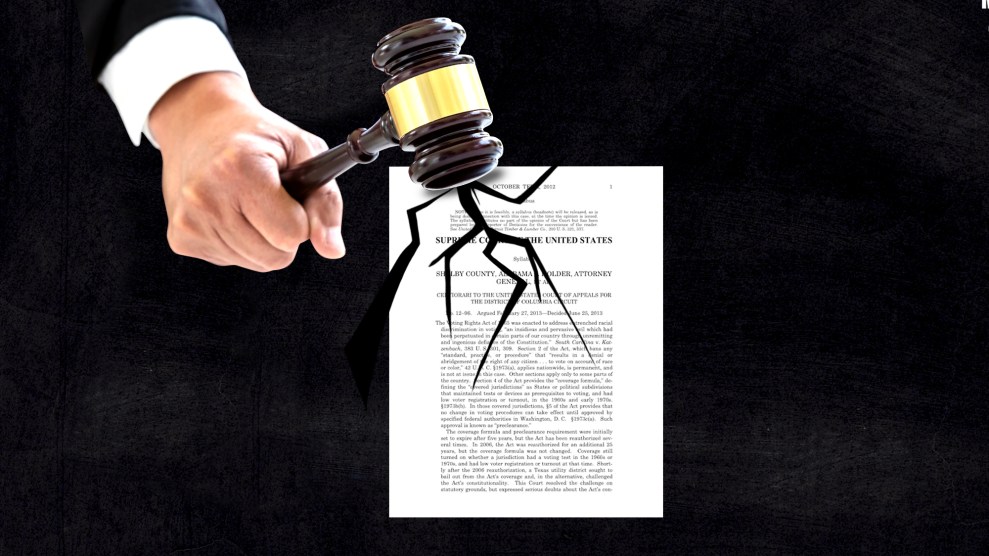
Mother Jones; Joshua Lott/AFP/Getty
In a major and surprising victory for voting rights, the Supreme Court ruled on Thursday that a redistricting map passed by Alabama lawmakers diluted the power of Black voters, affirming the constitutionality of a key remaining part of the Voting Rights Act of 1965.
Alabama has a Black population of 27 percent, but just one of the state’s seven congressional districts is likely to elect a candidate favored by Black voters. Civil rights groups sued in 2021 during the last redistricting cycle and said the failure of the state to draw a second majority-Black district violated Section 2 of the VRA. A three-judge panel that included two appointees of Donald Trump agreed, writing that “Black voters have less opportunity than other Alabamians to elect candidates of their choice to Congress.”
But last year, the Supreme Court temporarily reinstated Alabama’s original redistricting plan for the midterms. However, in a 5-4 ruling on Thursday authored by Chief Justice John Roberts, the Court affirmed the district court’s original finding. Justice Brett Kavanaugh concurred with Roberts’ decision in Allen v. Milligan. “We see no reason to disturb the District Court’s careful factual findings, which are subject to clear error review and have gone unchallenged by Alabama in any event.” Four conservative justices dissented.
Alabama argued before the court during oral arguments in October that any consideration of race when drawing new districts was itself discriminatory. “The purpose of the Voting Rights Act is to prevent discrimination and to foster our transformation to a society that is no longer fixated on race,” said Alabama solicitor general Edmund LaCour, “but plaintiffs would transform that statute into one that requires racial discrimination in districting and carries us further from the goal of a political system in which race no longer matters.”
But advocates for the VRA responded that this “race-blind” reasoning would reverse the very purpose of the law—to eradicate decades of discrimination against Black Americans and other historically disenfranchised minority groups. “Under the state’s approach,” responded U.S. solicitor general Elizabeth B. Prelogar, “nothing would stop Alabama and many other states from dismantling their existing majority-minority districts, leaving Black voters and entire swaths of the country with no ability to elect their preferred representatives.”
Though the Court’s conservative justices claim to believe in originalism and interpreting the Constitution as the framers intended it at the time, Justice Ketanji Brown Jackson noted during oral arguments that it was profoundly ahistorical to read the Constitution and the country’s civil rights laws without taking race into account. “The entire point of the [14th] amendment was to secure rights for the freed former slaves,” she said.
Roberts, in his opinion, said the case was about “Alabama’s attempt to remake our Section 2 jurisprudence anew… We find Alabama’s new approach to §2 compelling neither in theory nor in practice.”
The decision was particularly surprising in light of the hostility to voting rights shown by the court’s conservative majority. Roberts has been trying to weaken the VRA since he worked in the Reagan administration in the early 1980s. The Court has taken aim at voting rights from every angle, with disastrous consequences for democracy.
In 2013, the Roberts court ruled that states with a long history of discrimination no longer needed to have changes to their voting laws and electoral boundaries approved by the federal government, which opened the floodgates to a wave of new voter suppression efforts and racially gerrymandered maps. Eight years later, the court made it far more difficult to strike down laws that disadvantage minority voters.
We’ve already seen a stark impact from the court’s earlier decisions curtailing voting rights. As a result of the 2013 Shelby County v. Holder decision, the 2021 redistricting cycle was the first in 50 years where states with a history of discrimination no longer needed to have federal officials sign off on their redistricting maps. That led to a dramatic reversal in past advances for minority voters in states across the South, with Republican-controlled states either failing to draw new majority-minority districts to keep pace with demographic changes or dismantling existing ones, which had long thought to be illegal under the VRA.
It’s particularly noteworthy that two of the challenges to the VRA, in Shelby County and Allen, stemmed from Alabama, where civil rights protests in the 1960s inspired passage of the law.
The decision on Thursday will likely have consequences far beyond Alabama. States such as Georgia, Louisiana, and Texas are already facing federal lawsuits from civil rights groups for drawing maps that diluted the power of minority voters. And it is likely bad news for Florida Gov. Ron DeSantis, who pushed through a redistricting map that dismantled two US House districts held by Black representatives.
* This is a developing story.


















